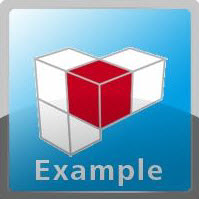Example: CANopen
Product: CODESYS CANopen Manager SL
This example deals with the programming interface of the communication stack of the CANopen Master and CANopen Slave. The project contains examples for SDO, NMT, diagnostics, and the dynamic configuration of communication parameters (baud rate, network ID, node ID), and many more.
Description
The project contains different examples for using the programming interface of the CANopen Master and CANopen Slave stack. Topics which are handled include the following:
SDO (expedited, segmented, block), access to the object dictionary
Network Management (NMT)
Diagnostics (CANopen state, EMCY)
Event handler for the object dictionary and CANopen manager state machine
Reconfigure: Dynamic changing of baud rate, network ID, and node ID
Access to the CAN configuration by means of the device diagnosis library
Additional information
The project includes a CANopen Master and a CANopen Slave stack which communicate with each other via CANbus. Two interconnected CAN interfaces are needed for commissioning the project. The easiest way to implement this is to use the CODESYS Control Win controller and a 2-channel USB-CAN adapter, such as PEAK PCAN-USB Pro or two 1-channel adapters.
For the communication to work, the respective runtime system component has to be entered in the configuration file.
For more information, see: Runtime Configuration.
The project can also be operated on any controller with two CAN interfaces by means of a device update of the PLC. The project is divided into three areas:
CANbus Examples
ChangeBaudrate: Dynamic change of baud rate in runtime mode by means of reconfigurationEnableDisableCANbus: Dynamic activation and deactivation of a CANbus in runtime mode by means of reconfigurationGetCANbus: Generic search of an engineered CANbus instance by means of the device diagnosis library
CANopen Master examples
Diagnostics
ReceiveEMCYFromAllDevicesExample: Reception of emergency messages by means ofCiA405.RECV_EMCYReceiveEMCYFromOneDeviceExample: Reception of emergency messages for a specific device by means ofCIA405.RECV_EMCY_DEVGetCANopenKernelStateExample: Detection of the CANopen kernel state by means ofCIA405.GET_CANOPEN_KERNEL_STATEGetStateExample: Detection of the CANopen state of a slave by means ofCIA405.GET_STATE
Network management
GetCANopenManagerNodeIDExample: Detection of the CANopenManager node ID by means of CiA405.GET_CANOPEN_KERNEL_STATE: Sending of NMT requests by means of CIA405.NMT
SDO (acyclic data transfer)
ExpeditedReadExample: Reading of an object <= 4 bytes via SDO (expedited transfer) by means ofCiA405.SDO_READ4ExpeditedWriteExample: Writing of an object <= 4 bytes via SDO (expedited transfer) by means ofCIA405.SDO_WRITE4SegmentedAndBlockReadExample: Reading of an object of any length via SDO (segmented transfer or block transfer) by means ofCiA405.SDO_READ_DATASegmentedAndBlockWriteExample: Writing if an object of any length via SDO (segmented transfer or block transfer) by means ofCiA405.SDO_WRITE_DATA
General API functions
CANopenManagerAPI: Demonstrates the use of all methods and properties of the CANopenManager instanceCANopenManagerEventHandler: Exemplary implementation of a CANopen event handlerCANopenRemoteDeviceAPI: Demonstrates the use of all methods and properties of a CANopenRemoteDevice instance
CANopen Slave examples
Diagnostics
GetLocalDeviceInfoExample: Demonstrates the reading of the CANopen state as well as the node ID
Network management
ChangeNodeIDExample: Change of the node ID in runtime modeNMTExample: Change of the local CANopen state
Object dictionary
ReadObjectExample1: Reading of an object from the local object dictionaryReadObjectExample2: Alternative example ofReadObjectExample1WriteObjectExample1: Writing the value of an object to the object dictionaryWriteObjectExample2: Alternative example ofWriteObjectExample1CountObjects: traverse over all objects of the object dictionary by means of_3SCSS.ObjectIteratorGetPDOInfo: Additional example of traversing the object dictionaryObjectDictionaryEventHandler: Exemplary implementation of an object dictionary event handler
System requirements and restrictions
Programming system | CODESYS Development System (version 3.5.14.0 or higher) |
Runtime system | CODESYS Control Win (version 3.5.14.0) |
Add-on components | Two CAN interfaces |
Note
 DOWNLOAD Project
DOWNLOAD Project